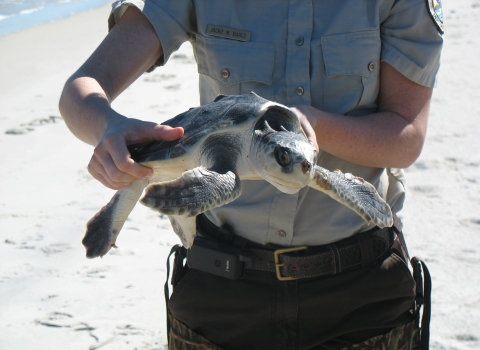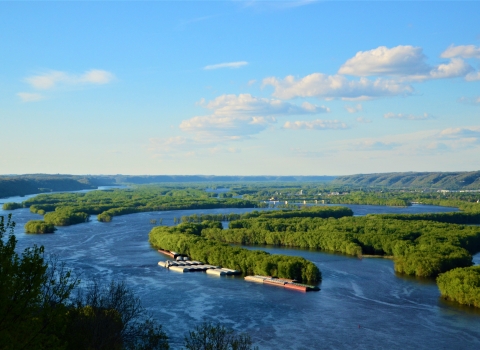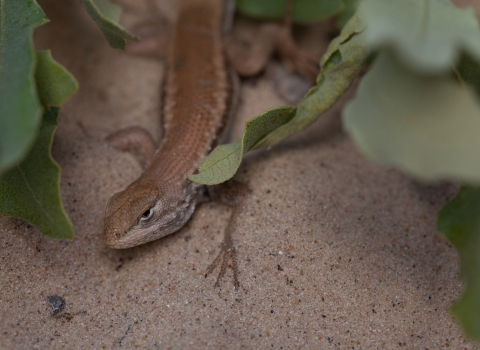Today, the U.S. Fish and Wildlife Service and Association of Zoos and Aquariums (AZA) are announcing distribution of the second wave of awards – a total of over $9 million – under the Endangered Species COVID-19 Relief program, funded by the American Rescue Plan.
“The Service continues to work with longtime partner AZA to reimburse plant and animal care facilities in this second distribution of critical American Rescue Plan funding,” said Service Director Martha Williams. “These funds will help continue these institutions’ high-quality efforts to protect the nation’s imperiled species.”
“The animal care stories we have learned through the application process are extraordinary, as are the costs associated with that care. We continue to be grateful to partner with the Service to distribute the funds. The relief this program is providing to facilities that care for federally protected species is necessary and needed,” said Dan Ashe, President and CEO of AZA.
As part of the American Rescue Plan Act of 2021, Congress recognized the dedication of zoos, aquariums, botanic gardens and other facilities across the nation in helping save animals and plants from extinction by appropriating $30 million to reimburse expenses related to the care of captive species listed under the Endangered Species Act (ESA), as well as rescued and confiscated wildlife that are at risk of extinction. The first wave of reimbursements – over $1.6 million – was released in April.
The facilities receiving reimbursement funds include:
- Arizona – Southwest Wildlife Conservation Center, $44,154
- California – Living Coast Discovery Center, $15,701; The Living Desert Zoo and Gardens; $76,340; Oakland Zoo, $159,690; Sacramento Zoo, $45,040; Steinhart Aquarium, California Academy of Sciences, $49,291; Wild Wonders, $7,477
- Connecticut – The Maritime Aquarium at Norwalk, $98,058
- Florida – Central Florida Zoological Society, $308,213; Clearwater Marine Aquarium, $56,439; The Florida Aquarium, $449,228; Theater of the Sea, $88,097; Zoo Tampa, $480,687
- Hawaii – Bishop Museum, $225,390
- Illinois – Lincoln Park Zoo, $343,472; Miller Park Zoo, $25,825
- Iowa – National Mississippi River Museum & Aquarium, $30,108
- Maryland – National Aquarium, $182,143
- Michigan – Binder Park Zoo, $396,656; Detroit Zoo, $198,190; John Ball Zoo, $82,642
- Missouri – Endangered Wolf Center, $1,000,000; Saint Louis Zoo, $316,372
- Nebraska – Omaha’s Henry Doorly Zoo and Aquarium, $113,558
- New Jersey – Adventure Aquarium, $65,840
- New York – Atlantic Marine Conservation Society, $64,598; Buffalo Zoo, $161,865; Wolf Conservation Center, Inc., $32,663
- North Carolina – North Carolina Zoo, $817,474; Rowan Wild, $16,287
- Oklahoma – Oklahoma Aquarium, $183,263
- Oregon – Oregon Coast Aquarium, $117,987
- Pennsylvania – Lehigh Valley Zoo, $58,010; Pittsburgh Zoo & PPG Aquarium, $514,053
- Puerto Rico – Red Caribena de Varamientos, $437,003
- South Carolina – South Carolina Aquarium, $456,617
- Tennessee – Tennessee Aquarium, $14,474
- Washington – Point Defiance Zoo & Aquarium, $331,917; Northwest Trek, $102,304; Seattle Aquarium, $256,122
- Texas – Dallas Zoo, $156,749
- Utah – Loveland Living Planet Aquarium, $83,546
- Virginia – Virginia Aquarium & Marine Science Center Foundation, Inc., $344,386
- Wisconsin – New Zoo and Adventure Park, $32,691
Funds released today will be directed toward reimbursing these 44 facilities for expenses such as:
- Food.
- Veterinary care/medicine.
- Direct animal/plant care staff time.
- Life-support systems.
- Transport for medical, reintroduction into the wild, and captive breeding purposes.
- Real property debt and holding space improvements/modifications.
- Utilities essential for the care of species (e.g., electricity/gas/natural gas to power essential services).
Zoos, aquariums and other facilities work alongside the federal government to support recovery programs, rehabilitate injured animals, care for confiscated wildlife, and help save endangered species from extinction, including manatees, sea turtles, black-footed ferrets, California condors, Florida corals, Mexican wolves, red wolves, northern and southern sea otters, Eastern indigo snakes, Wyoming toad and many others.
Additional information about the Endangered Species COVID-19 Relief program can be found on AZA’s website at http://www.aza.org/endangered-species-COVID-funding.
Founded in 1924, the Association of Zoos and Aquariums is a nonprofit organization dedicated to the advancement of zoos and aquariums in the areas of conservation, animal welfare, education, science, and recreation. AZA is the accrediting body for the top zoos and aquariums in the United States and 12 other countries. Look for the AZA accreditation logo whenever you visit a zoo or aquarium as your assurance that you are supporting a facility dedicated to providing excellent care for animals, a great experience for you, and a better future for all living things. The AZA is a leader in saving species and your link to helping animals all over the world. To learn more, visit www.aza.org.





